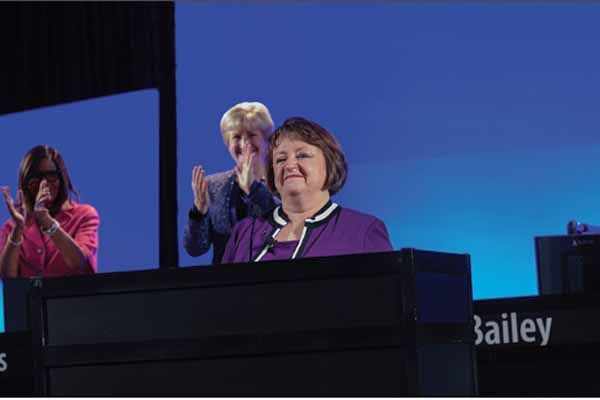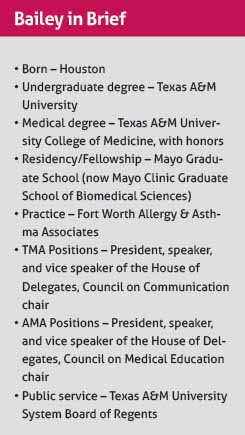
Nothing had changed, and yet everything had changed.
Many U.S. physicians feared their practices were in dire straits, then they learned how bad “dire” really could be. Americans’ unhealthy lifestyles threatened their health, then a deadly and highly infectious virus added to the threats and upended their lifestyles. Health care had become an unaffordable luxury for millions of Americans, then came massive unemployment and the concomitant loss of job-related health insurance.
Into this maelstrom on June 7 strode Fort Worth allergist Susan Rudd Bailey, MD.
Chosen unanimously last year to be the 175th president of the American Medical Association, Dr. Bailey had planned to take the oath of office in a huge ballroom packed with guests in formal attire. Then came COVID-19 with its social distancing requirements and physicians far too busy to gather in Chicago for a five-day convention. Instead, they watched her installation on laptop and smartphone screens, scattered across the nation.
“And that’s OK,” she said, just moments after being sworn in. “As physicians, we understand better than anyone how a health emergency can disrupt even the most carefully thought-out plans.”
And Dr. Bailey – whose organized medicine resume includes stints as presidents of the Texas Medical Association and Tarrant County Medical Society as well as speaker of the TMA and AMA House of Delegates – says she feels prepared for this health emergency. “Being president of the TMA when the Affordable Care Act (ACA) was passed is good training for being president of the AMA during the coronavirus pandemic,” she told Texas Medicine.
The physicians closest to Dr. Bailey agree.
“I am thrilled to tears that she is going to be the president of the AMA,” said Fort Worth pediatric emergency medicine specialist Melissa Garretson, MD. “Sue is the right person in the right job to move American medicine forward.”
Andrew W. Gurman, MD, an orthopedic hand surgeon from Pennsylvania, served side-by-side with Dr. Bailey on the AMA House of Delegates dais for four years; he was speaker and she was vice speaker. “She is immensely qualified,” said Dr. Gurman, who went on to be AMA president in 2016-17. “She’s very smart, but more than smart, she’s always prepared. She always knows her stuff.”
Let doctors be doctors
Dr. Bailey says the pre-COVID-19 problems she intended to tackle in her year as AMA president have grown in magnitude since the virus took hold. They include administrative burdens and “ridiculous regulations” such as prior authorization requirements and aspects of Medicare’s Quality Payment Program; the growing threats to independent private practice; and the ACA’s shortcomings that still leave nearly 28 million Americans uninsured.
“These things are more important than ever because although we’re seeing everything through a COVID lens these days – and what we’re seeing is not pretty at all – COVID has made these needs much more acute,” she said. “So the importance of working on these things has really been exposed.”
Robert Rogers, MD, who has been Dr. Bailey’s partner in Fort Worth Allergy & Asthma Associates for more than 30 years, knows first-hand that she is an experienced businesswoman as well as a skilled politician and an inspiring speaker. “We will have someone who understands what it means to run a medical practice as a business and be an advocate to protect those practices and keep doctors working and taking care of patients,” he said.
Dr. Bailey touts her “boots-on-the-ground experience” with prior authorizations, balance sheets, and managing medical practice staff. “That makes it all very real for me,” she said.
Dr. Garretson says sustaining physician practices has to be her mentor’s No. 1 task as AMA president this year. “Imagine if all of our physicians shutter our doors,” she said. “Where is anyone going to get health care that doesn’t involve an emergency department?” And she is confident that Dr. Bailey’s private practice experience is “going to serve all physicians well” in her new post.

Immunology expertise
On June 5, 1981, exactly one day before Dr. Bailey received her medical degree with honors as part of the charter class at the Texas A&M University College of Medicine, the U.S. Centers for Disease Control and Prevention announced the discovery of an “unidentified new illness” that ravaged its victims’ immune systems. That illness eventually became known as HIV/AIDS.
A disease she never studied in medical school became a topic of significant interest during Dr. Bailey’s pediatric residency and allergy/immunology fellowship at Mayo Graduate School (now called the Mayo Clinic Graduate School of Biomedical Sciences).
“I remember thinking to myself, ‘Oh God, this is going to be terrible.’ I had an awful feeling about it, and unfortunately I was right,” she said, recounting a lecture from a physician/scientist named Anthony Fauci, MD, then chief of the Laboratory of Immunoregulation at the National Institutes of Health (NIH).
Dr. Fauci went on to lead the NIH response to the HIV/AIDS epidemic and now, of course, is one of the Trump Administration’s most visible scientific advisors on COVID-19.
Dr. Bailey is hesitant to draw too many comparisons between the two diseases, if only because of the “kerosene-on-fire” speed with which the novel coronavirus spread across the globe. “The only connection I see is the anxiety among the public, the fear, the uncertainty, and the irrational behavior that ensued because people didn’t know any better,” she said.
Dr. Rogers, however, says now the country needs a medical leader with Dr. Bailey’s training and background.
“Virtually everything that’s going on with this virus one way or another has to do with evaluating the immune response to it,” he said. “We’re incredibly fortunate that she has decades of experience translating that into a language nonmedical people can understand.”
That kind of leader
Whether it’s helping Americans adjust to a world with a terrifying new virus, undoing the politicization of public health and science, or rebuilding the financial viability of physicians’ practices, those who know her well say Sue Bailey is the woman for the job.
“She can be very focused,” said Dr. Gurman, the former AMA president and speaker of the house. “She’s a no-BS kind of lady.”
Dr. Rogers sees something subtler in his practice partner’s leadership style.
“People who achieve these kinds of heights have to have pretty strong egos,” he said. “Sue has that ego and drive and confidence packaged in a way that is acceptable and warm and calming. She brings you along. She engages you. It’s a let’s-all-do-this-great-thing-together kind of approach.”
And Dr. Garretson, who managed Dr. Bailey’s campaigns for AMA offices, saw it in action as she asked physicians to vote for her dear friend.
“For Sue, it is a genuineness,” she said. “She really actually cares about people, and she’s engaged with people. She’s direct, but kind about being direct. That’s why people like her.”
True to form, Dr. Bailey says she has and will lean on outside help to tackle the challenges ahead.
“I depend very strongly on my Christian faith and my family, which includes my TMA/AMA/organized medicine family,” she told Texas Medicine. “I really do feel like organized medicine is part of my family. I feel that personally. Those relationships are what sustain me.”
Tex Med. 2020;116(7):12-13
July 2020 Texas Medicine Contents
Texas Medicine Main Page